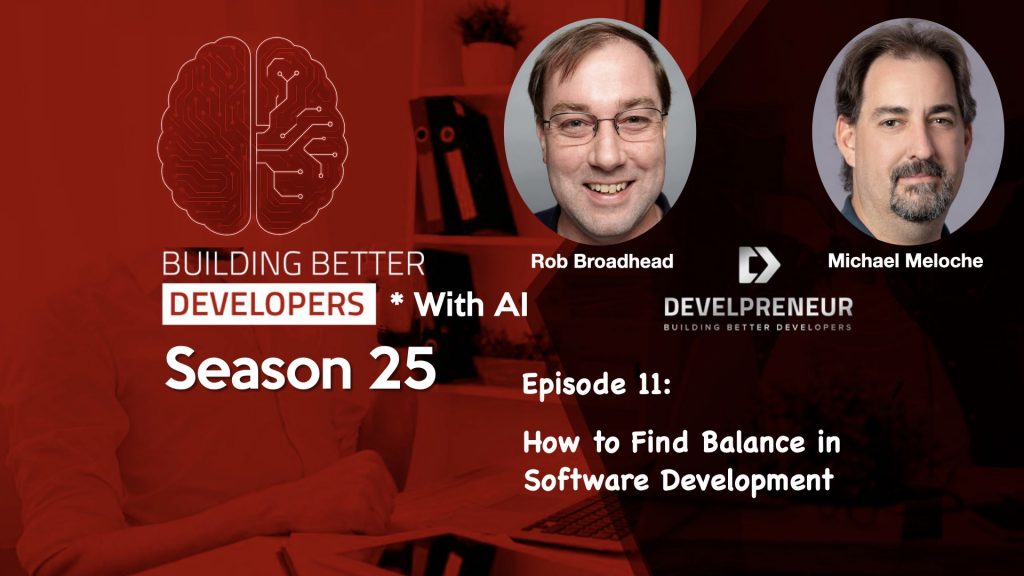In this episode of Building Better Developers with AI, Rob Broadhead and Michael Meloche delve into the challenges of burnout and overwork, discussing how developers can regain control over their time. By emphasizing the importance of finding balance in software development, they offer practical techniques for staying productive without compromising well-being.
Rethinking Hustle Culture in Software Development
“Productivity isn’t about motion. It’s about momentum—in the right direction.” – Rob Broadhead
The myth of endless hustle runs deep in tech. Developers often mistake working late nights for progress—but it usually leads to burnout and declining code quality. The key to achieving balance in software development is recognizing when it’s time to slow down.
Warning Signs You’re Losing Balance as a Developer
- Declining communication or code quality
- Constant frustration or tunnel vision
- Difficulty disconnecting from work
- Feeling like you’re always behind
The solution often lies not in working harder—but in pausing with purpose.
Using Strategic Pauses to Regain Balance in Software Development
One of the most effective ways of finding balance in software development is to embrace micro and macro pauses. These breaks help reset your mindset and restore focus.
- Micro breaks: Pomodoro sprints, quick walks, or code reviews
- Macro breaks: Weekend retreats, sabbaticals, or screen-free days
Michael notes that even seasoned pros struggle with stepping away. But taking intentional time off isn’t a luxury—it’s a necessity.
Developer Tip: Code Commit and Mental Reset
When feeling overwhelmed, commit your progress, walk away, and revisit it later with a fresh mindset. This small act can realign your thinking and productivity.
The Role of Pivoting in Achieving Work-Life Balance in Tech
Sometimes a pause isn’t enough—you need to pivot. And in the context of finding balance in software development, pivoting means realigning your goals, projects, or even your work relationships.
Types of pivots discussed:
- Switching tools or tech stacks
- Killing ineffective features
- Saying no to toxic clients
- Shifting job roles or responsibilities
When to Pivot for Developer Success
- Are you stuck solving the wrong problem?
- Are sunk costs keeping you on the wrong path?
- Is your current direction still aligned with your goals?
If not, it may be time to pivot and prioritize balance.
Tools and Tactics for Finding Balance in Software Careers
To close the episode, Rob and Michael outline several tools for creating balance in your developer workflow:
- Timeboxing and Pomodoro sessions
- Weekly journaling to identify stress triggers
- Asynchronous communication to reduce meetings
- Workspace adjustments for deep work vs. ideation
Optimize Your Work Environment for Software Development Balance
Experiment with different workspaces for different tasks—coding, brainstorming, or planning. These physical cues help your brain switch gears and stay fresh.
Final Thoughts: Building a Sustainable Career in Software Development
Finding balance in software development is more than a productivity hack—it’s a mindset shift. Whether you’re pausing for five minutes or pivoting away from a demanding client, your ability to reset and refocus determines long-term success.
When developers learn to pause with purpose and pivot with intention, they don’t just write better code—they build better careers.
Stay Connected: Join the Developreneur Community
We invite you to join our community and share your coding journey with us. Whether you’re a seasoned developer or just starting, there’s always room to learn and grow together. Contact us at [email protected] with your questions, feedback, or suggestions for future episodes. Together, let’s continue exploring the exciting world of software development.

